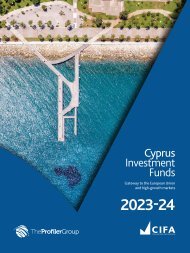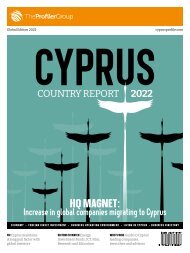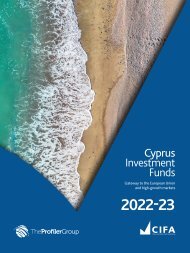2020 Cyprus Country Report
The 2020 Cyprus Country Report features in-depth articles on the economy, foreign direct investment, international trade and headquartering as well as detailed sector profiles and insights from Cyprus’ 100 most influential political, economic and business leaders shaping the future of their country and its industries.
The 2020 Cyprus Country Report features in-depth articles on the economy, foreign direct investment, international trade and headquartering as well as detailed sector profiles and insights from Cyprus’ 100 most influential political, economic and business leaders shaping the future of their country and its industries.
You also want an ePaper? Increase the reach of your titles
YUMPU automatically turns print PDFs into web optimized ePapers that Google loves.
The economy<br />
of <strong>Cyprus</strong> is<br />
expected to<br />
suffer in <strong>2020</strong><br />
due to the<br />
outbreak of<br />
the Covid-19 pandemic. Recent<br />
estimates project shrinking of<br />
the GDP by approximately 7%<br />
due to the sharp slowdown in<br />
domestic economic activity<br />
and the contraction of GDP<br />
both in Europe and the rest<br />
of the world. Measures taken<br />
by the government have<br />
temporarily prevented the<br />
loss of job positions, however<br />
the situation is still fluid while<br />
the Covid-19 continues.<br />
George Petrou<br />
Chairman<br />
<strong>Cyprus</strong> Employers and<br />
Industrialists Federation (OEB)<br />
Muskita Aluminium Industries<br />
ing and production, and prides itself on fostering<br />
green initiatives. In 2019, the electricity-intensive<br />
business set up 6,750 panels with 2.5 MW in total,<br />
constituting the biggest roof solar power system<br />
in the country, which will meet almost a third of<br />
the company’s demand.<br />
Today, Muskita is one of the most technologically<br />
advanced firms in its industry worldwide<br />
and the largest, most progressive factory of its<br />
kind in <strong>Cyprus</strong>. The company’s systems have<br />
been tested and certified to withstand the severe<br />
rain and snow of Northern Europe, the pounding<br />
cyclones of the Indian Ocean and the searing heat<br />
of the Middle East. Its products are used internationally,<br />
a testament to the cutting-edge technology,<br />
engineering, quality and skilled workforce<br />
that have been paramount to the company’s<br />
success.<br />
OPPORTUNITIES AND CHALLENGES<br />
Access to financing has been a serious concern<br />
for small manufacturers because financial institutions<br />
have set stricter lending conditions in<br />
the wake of <strong>Cyprus</strong>’ 2013 bailout – and now with<br />
the challenges brought about with the coronavirus<br />
pandemic. Although the economic climate<br />
has improved substantially, the financing environment<br />
remains difficult for SMEs which have<br />
limited collateral available and many companies<br />
also remain indebted. In a bid to support SMEs,<br />
<strong>Cyprus</strong> is offering opportunities to make use of<br />
tax breaks for new export-oriented companies,<br />
access to training grants and soft loans, as well as<br />
funding opportunities for small start-up companies.<br />
Climate change remains a big issue and to<br />
address the common complaint by manufacturers<br />
about the high cost of electricity, the strategy<br />
will incentivise greater use and development of<br />
renewable energy resources (RES). Installing<br />
new, clean energy-powered heating and cooling<br />
systems in factories will be a priority. With the<br />
island’s aims to become a hub for solar innovation,<br />
technology transfer and start-ups, the clean<br />
energy industry is ripe for foreign investment.<br />
The future exploitation of significant natural gas<br />
reserves in <strong>Cyprus</strong>’ waters could also facilitate<br />
growth in the manufacturing sector, with prospects<br />
of using the island’s own energy supply to<br />
lower production costs in the future. The national<br />
strategy is undertaking a techno-economic study<br />
for industrial sustainable management of waste<br />
and assessing the capacity to generate electricity<br />
from better waste management in industrial<br />
zones. In addition, the study will examine<br />
the possibility of installing treatment plants for<br />
wastewater from food and wastewater industries.<br />
The results of the study will eventually create new<br />
grant schemes and other incentives to industries<br />
and SMEs.<br />
The new industrial strategy policy is designed<br />
to maximise the opportunities and address the<br />
challenges inherent in a sector where most enterprises<br />
are SMEs largely dependent on imported<br />
raw materials from distant markets. A major<br />
strength of the strategy is that it was formulated<br />
after lengthy consultations between the government<br />
and stakeholders, primarily the private<br />
sector’s two main representative and lobbying<br />
bodies, the <strong>Cyprus</strong> Chamber of Commerce and<br />
Industry (CCCI) and the <strong>Cyprus</strong> Employers and<br />
Industrialists Federation (OEB). All stakeholders<br />
are working together to make the strategy work.<br />
Most SMEs are entrepreneurial and have the advantage<br />
of being agile, flexible and innovative, but<br />
face difficulty in keeping the cost of imported raw<br />
materials down by buying in bulk. Now plans for<br />
clustering units of similar producers that can join<br />
in bulk orders will reduce costs.<br />
On another front, the new strategy has plans to<br />
boost competitiveness and productivity by ensuring<br />
that the sector’s labour force is continuously<br />
trained to capitalise on rapidly evolving technologies.<br />
This, together with further investment in<br />
modern tech solutions, will enable manufacturers<br />
to keep their advantage over competition from<br />
lower-wage producers in Eastern Europe.<br />
INNOVATING INDUSTRY<br />
<strong>Cyprus</strong> SMEs are increasingly following the<br />
pioneering lead of several large, innovative and<br />
export-oriented companies, and with renewed<br />
support and incentives in place, <strong>Cyprus</strong> will<br />
certainly see a revolution in this sector in the<br />
coming years. The foundations are there to<br />
further strengthen and expand a strong industrial<br />
base in <strong>Cyprus</strong>, and the island has a<br />
deep pool of well-educated human capital and<br />
a sophisticated infrastructure to help tackle<br />
future challenges. In addition, its strategic location<br />
with good connectivity makes it the ideal<br />
springboard for European manufacturers keen<br />
to expand into the markets of the East and vice<br />
versa. It may take a few years to see concrete<br />
results from the new industrial strategy policy,<br />
but <strong>Cyprus</strong>’ manufacturing and industrial sector<br />
is determined to realise its true potential. The<br />
guiding vision is to create a robust, flexible and<br />
technologically advanced industry with services<br />
that will substantially contribute to the development<br />
of the overall Cypriot economy. n<br />
Discover more at www.cyprusprofile.com<br />
Sector Profile<br />
<strong>Country</strong> <strong>Report</strong> CYPRUS <strong>2020</strong> 115

















